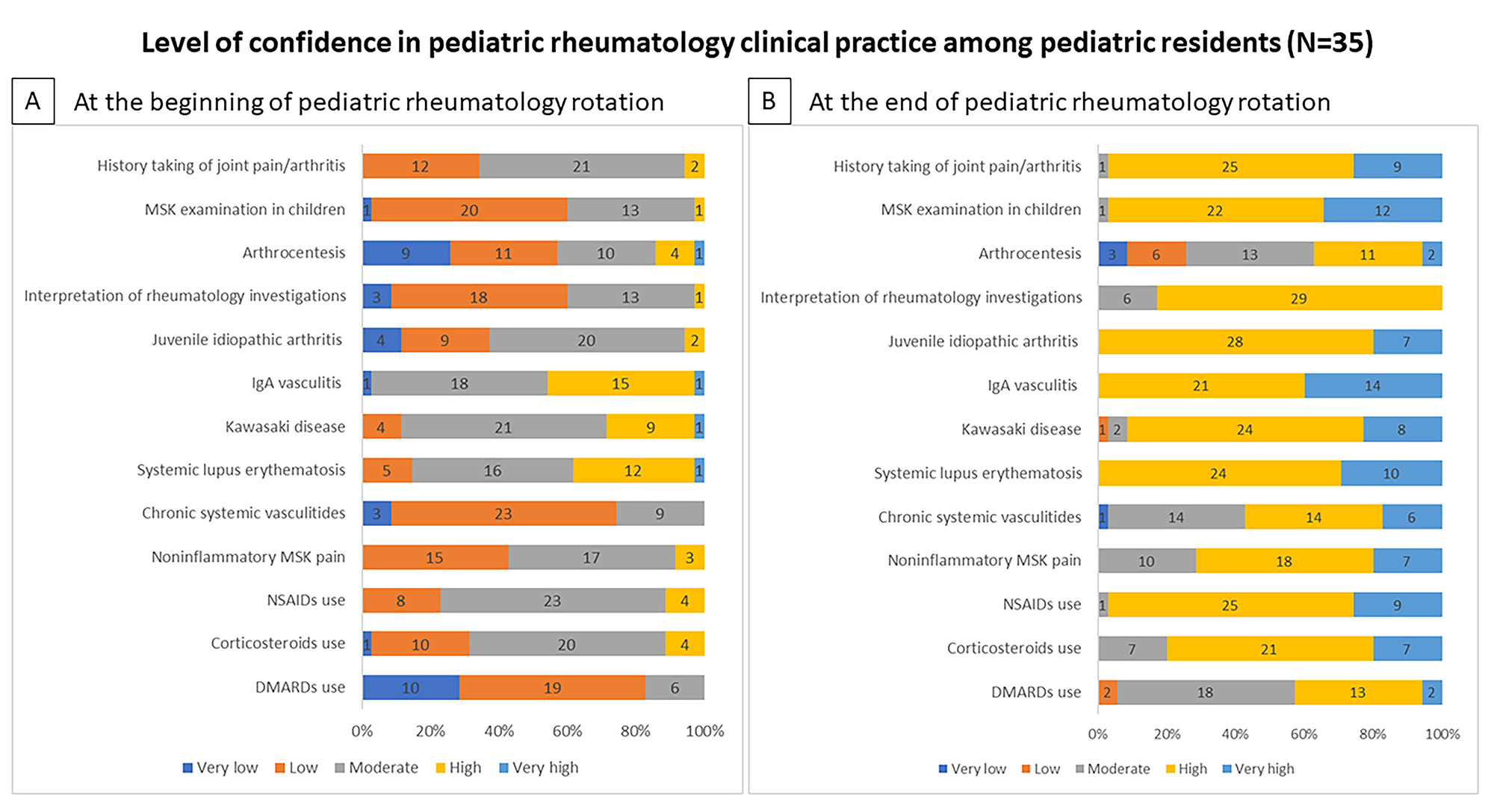Session Information
Session Type: Poster Session A
Session Time: 1:00PM-3:00PM
Background/Purpose: Due to the scarcity of pediatric rheumatologists in Thailand, general pediatricians are mostly the first to encounter patients with musculoskeletal (MSK) complaints. The objectives were to evaluate the structured educational activities of knowledge, MSK examination skills, and confidence among pediatric residents who attended the pediatric rheumatology rotation.
Methods: Pediatric residents who attended a 4-week pediatric rheumatology rotation were enrolled from July 2020 to April 2022. On day 1, residents participated in a pre-test of 25-item multiple choice questions (MCQ) covering the essential topics in pediatric rheumatology, a questionnaire to evaluate experiences and level of confidence in pediatric rheumatology clinical practice (5-Likert scales; very low, low, moderate, high, and very high), and a self-study of the Pediatric Gait Arms Legs Spine (pGALS) tool. On day 2, a pretest of MSK examination using 18 items from Thai pGALS was assessed at the pediatric rheumatology clinic (total score 36; 0 for not done, 1 for incomplete, and 2 for complete). Pediatric residents were taught MSK examination skills at the first pediatric rheumatology clinic on week 1, followed by two sessions of interactive lectures including “approach to arthritis” on week 2 and “emergency in pediatric rheumatology” on week 3, 4 sessions of weekly topic review in pediatric rheumatology, and involvement in in-patient and out-patient pediatric rheumatology consultation. At the end of the 4-week rotation, residents were reevaluated by the posttests of MCQ and MSK examination skills. A questionnaire was performed to evaluate the confidence (5-Likert scales; very low, low, moderate, high, and very high) and attitude towards pediatric rheumatology (5-Likert scales; strongly agree, agree, neutral, disagree, and strongly disagree).
Results: There were 35 pediatric residents (28 F: 6 M) enrolled with a mean age of 28.9±0.7 years. The median (IQR) posttest scores in knowledge and MSK examination skills significantly increased from the pretest scores (knowledge pretest 16 (14-19) and posttest 20 (20-22), p< 0.001; MSK examination skills pretest 24 (21-28) and posttest 35 (33-36), p< 0.001). The level of confidence in pediatric rheumatology clinical practice significantly increased at the end of the rotation compared to the beginning of the rotation in all aspects including history taking of rheumatic and MSK diseases, MSK examination, rheumatology laboratory interpretation, diagnosis and treatment of rheumatologic diseases (all p< 0.001), and arthrocentesis (p=0.002). The exit survey revealed that most residents agreed that teaching of pediatric rheumatology should be enhanced in pediatric residency training.
Conclusion: The 4-week structured curriculum development in pediatric rheumatology rotation significantly increased pediatric residents’ knowledge, MSK examination skills, and confidence in pediatric rheumatology and should be mandatorily included in pediatric residency training.
To cite this abstract in AMA style:
Sukharomana M, Charuvanij S. The Structured Curriculum Development Significantly Increased the Pediatric Residents’ Competency and Confidence During a 4-week Pediatric Rheumatology Rotation [abstract]. Arthritis Rheumatol. 2022; 74 (suppl 9). https://acrabstracts.org/abstract/the-structured-curriculum-development-significantly-increased-the-pediatric-residents-competency-and-confidence-during-a-4-week-pediatric-rheumatology-rotation/. Accessed .« Back to ACR Convergence 2022
ACR Meeting Abstracts - https://acrabstracts.org/abstract/the-structured-curriculum-development-significantly-increased-the-pediatric-residents-competency-and-confidence-during-a-4-week-pediatric-rheumatology-rotation/

